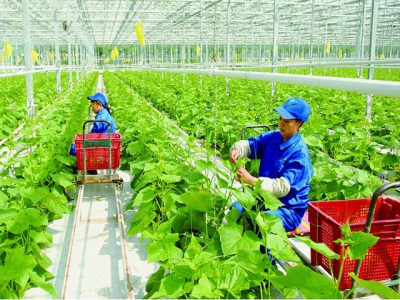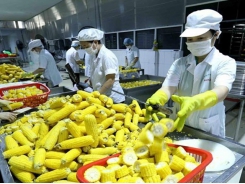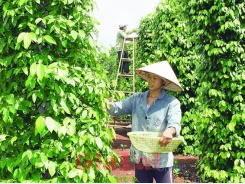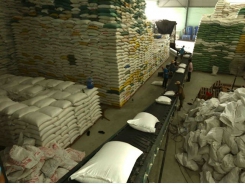Needed - A proper strategy to attract FDI in agriculture

Foreign direct investment (FDI) in the agricultural sector remains modest, accounting for just 1.61 percent of the total number of FDI projects and 0.97 percent of all FDI capital in Vietnam. Vietnam must therefore adopt clear policies to attract additional foreign capital for agriculture.
Low, unstable investment
According to the Information Center for Agriculture and Rural Development (AGROINFO) under the Institute of Policy and Strategy for Agriculture and Rural Development (IPSARD), as of late 2019, FDI in Vietnamese agriculture reached US$3.5 billion, accounting for 0.97 percent of total FDI capital in Vietnam, while the global average is three percent. The biggest foreign investors in the Vietnamese agricultural sector included Chinese Taipei, the Virgin Islands (UK), Singapore and Thailand, which accounted for more than 50 percent of total foreign investment capital in the sector.
Nguyen Thi Hong Thanh from AGROINFO said FDI in the agricultural sector remains modest, unstable and incommensurate with its potential, mainly targeting provinces and cities with favorable conditions. The diversity of foreign investors in the sector is also limited, focused on cultivation, animal husbandry, forestry, aquaculture, and agricultural production and services.
Foreign investment in the sector has brought technology transfer and new production models that have improved the added value and competitiveness of Vietnamese products. It has also helped to create more jobs and improve infrastructure in rural areas, and enabled direct connections with global value chains.
But further foreign investment is hampered by difficulties in accessing land to develop a stable source of materials and limited logistics services and infrastructure.
According to Vu Xuan Dang, Deputy Director of the Southern Investment Promotion Center of the Ministry of Planning and Investment’s Foreign Investment Agency, many localities lack large land funds for agricultural production, while some with large land funds give priority to industrial parks. To boost investment, infrastructure needs to be improved and the local labor force must be upskilled for work in high-technology agricultural enterprises. The connectivity between farmer households and FDI enterprises also requires upgrading.
Joint ventures needed
A strategy to attract FDI in agriculture needs to encourage investment in high value added farm produce processing industries. Priority needs to be given to attraction of investors with advanced technology and links to global chains, and to ensuring environmental protection and sustainability. Such a strategy needs to encourage FDI projects to enter joint ventures with domestic enterprises.
Le Minh Thuy Trang from the European Chamber of Commerce in Vietnam (Eurocham) said administrative procedures were the top concern of foreign investors. The government has policies to attract foreign investors, including corporate tax and land rental incentives, but the policies should clearly state the incentive rates, she said.
Deputy Director of the Southern Investment Promotion Center Vu Xuan Dang said the country needs to create more favorable conditions for foreign investors, including policies to encourage the development of central animal husbandry areas and material zones, large-scale fields, and high-tech agricultural zones. The government should increase investment in infrastructure development in the northern mountainous region, the Central Highlands, and the Mekong Delta, which all have high potential for agricultural development. Improving the quality of local human resources to meet agricultural development in the Fourth Industrial Revolution is also a must, he added.
“The Vietnamese Government holds high hopes for a green and safe agricultural sector that could be a driving force for growth just like the manufacturing and processing sector,” stated Minister of Agriculture and Rural Development Nguyen Xuan Cuong.
Contrary to a modest foreign capital inflow into the sector, a growing number of domestic firms are betting on the future of agriculture, especially high-tech farming, including Vinamilk, TH Truemilk, Thaco, Dabaco Vietnam, Masan, Lavifood, FLC, and Ba Huan, among others.
A representative of the Foreign Investment Agency under the Ministry of Planning and Investment said despite its high potential, the agricultural sector with its existing shortcomings of fragmented and small-scale production is not attractive enough to lure high-quality FDI. “In fact, investors in the agricultural sector face numerous risks, including bad weather, natural disasters or diseases,” he noted.
Nguyen Thi Hong Thanh from AGROINFO said it is necessary to simplify procedures and ease FDI enterprises’ access to land through better planning activities. The way should be paved for FDI businesses to lease land and cooperate with cooperatives and farmers, while digital technology must be adopted for tax-related administrative procedures.
The Politburo issued Resolution 50-NQ/TW dated August 20, 2019 on improvement of FDI policies and efficiency to 2030, while the government adopted Resolution 58/NQ-CP dated April 27, 2020 referring to its action program for Resolution 50-NQ/TW implementation, and Investment Law 61/2020/QH14 took effect on January 1, 2021. A decree providing guidelines for the investment law implementation needs to be issued soon.
Có thể bạn quan tâm
Phần mềm

Phối trộn thức ăn chăn nuôi

Pha dung dịch thủy canh

Định mức cho tôm ăn

Phối trộn phân bón NPK

Xác định tỷ lệ tôm sống

Chuyển đổi đơn vị phân bón

Xác định công suất sục khí

Chuyển đổi đơn vị tôm

Tính diện tích nhà kính

Tính thể tích ao hồ



 Hanoi strives to have all communes meeting new-style…
Hanoi strives to have all communes meeting new-style…  RCEP helps Vietnamese agricultural products reach out to…
RCEP helps Vietnamese agricultural products reach out to…